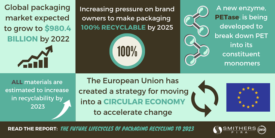Sustainable Flexible Packaging
Printing: Label Substrate
Sustainability Drive Is Good News for BOPP Film
December 12, 2019
Keep the info flowing with our eNewsletters!
Get the latest industry updates tailored your way.
JOIN TODAY!Copyright ©2025. All Rights Reserved BNP Media.
Design, CMS, Hosting & Web Development :: ePublishing










